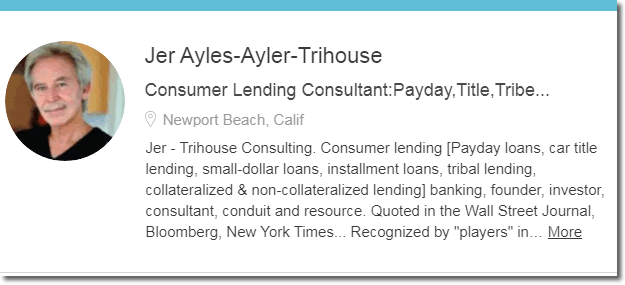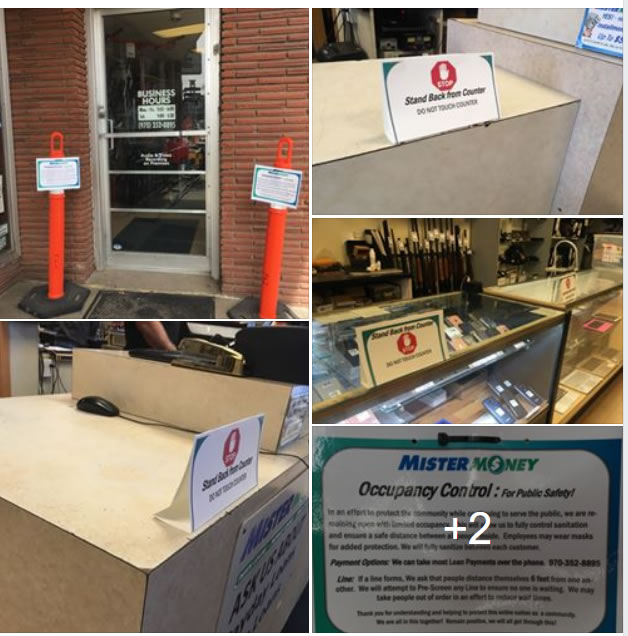I’ve been pounding the table lately regarding the need for ALL entrepreneurs in ALL industries to collaborate with competent experts who know how to legally prepare you for this litigious society we live in! Yes, I’m well aware of the propaganda! “There are more payday loan stores in the USA than there are McDonald’s.” B.S!
- Store count is down. There is this “thing” called the INTERNET.
- Everyone has a smartphone. We have a white-labeled app enabling the masses – even those lacking a bank account – to access a few hundred bucks within minutes via a virtual MasterCard, ACH deposits… We enable the borrower to select their own custom payment plan. They choose when and how to pay us back. Our lower loan production costs = lower CAQ costs = lower customer fees < APR’s
- Implementation of strategies for asset protection and tax reduction is NOT illegal. Attorney Howard Rosen recently discussed this topic in-depth here: Howard Rosen, Esq.
- It’s extremely expensive and time-consuming to secure lending licenses, compliance/regulatory IP state-by-state, followed by annual audits by incompetent government employees. For many entrepreneurs and consumers, the tribal model is a better solution. [Explore here: The Tribal Sovereign Lending Model.]
- The payday loan product IS A DINOSAUR! Even ENOVA, the publicly traded lender that originally launched as CASHNETUSA in the ’90s disclosed on their last Quarterly Financial Report that single payment [payday loans] represents 2% of their loan portfolio. And they lent $380,000,000 in this 3-month period! CURO is about the same!
- Big Brother, PEW, CRL, CFPB … continue to dwell and waste taxpayer money on OLD NEWS!
Here’s the latest: More than 12,000 Arizona Car Buyers Eligible for Millions in Relief
PHOENIX—Attorney General Mark Brnovich, along with a coalition of 34 attorneys general, announced today a settlement with Santander Consumer USA Inc., one of the nation’s largest subprime auto lenders, that provides $550 million in relief for consumers, with millions more expected in additional deficiency waivers. More than 12,000 Arizona consumers will receive between $22.7 million and $41.5 million of relief (through restitution checks, in-kind relief, or debt forgiveness). The settlement resolves allegations that Santander violated consumer protection laws by giving high-interest loans to car buyers it knew could not afford them.
“Buying a car is one of the most important purchases a person makes in their life and companies involved in any transaction need to be as transparent as possible,” said Attorney General Mark Brnovich. “Santander knowingly put Arizonans into loans they couldn’t afford, setting them up for years of financial hardship. This settlement holds Santander accountable and provides thousands of Arizona consumers with much-needed financial relief.”
Based on the multistate investigation, the coalition alleges that Santander, through its use of proprietary credit scoring models to forecast default risk, knew that certain consumer segments were likely to default, yet issued high-interest loans to them anyway. Santander exposed these borrowers to unnecessarily high levels of risk through high loan-to-value ratios, significant back-end fees, and high payment-to-income ratios. The attorneys general also allege that Santander’s aggressive pursuit of market share led it to underestimate the risk associated with loans by turning a blind eye to dealer abuse and failing to monitor dealer falsification of income and expenses. Finally, the coalition contends that Santander engaged in deceptive servicing practices and actively misled consumers about the risks of partial payments and loan extensions.
Under the settlement, which is pending court approval, Santander is required to provide relief to consumers and is required to factor a consumer’s ability to pay the loan into its underwriting moving forward.
Santander will pay $65 million to the 34 participating states for restitution for certain subprime consumers who defaulted on loans between January 1, 2010, and December 31, 2019. For consumers with the lowest quality loans who defaulted as of December 31, 2019, and have not yet had their cars repossessed, Santander is required to allow them to keep their car and waive any deficiency balance on the loan, up to a total value of $45 million in deficiency waivers.
The settlement also includes significant consumer relief by way of loan forgiveness. In all, Santander has agreed to waive the deficiency balances for certain defaulted consumers, with approximately $433 million in immediate forgiveness of loans still owned by Santander, and additional deficiency waivers of loans that Santander no longer owns but is required to attempt to buy back from third parties.
Santander will also pay up to $2 million for a settlement administrator who will administer restitution claims, and pay an additional $5 million directly to the investigating states.
Arizona Consumer Settlement Terms
- Consumer Restitution: Over 12,000 Arizona consumers who defaulted on loans between January 1, 2010, and December 31, 2019, will receive a check for at least $224.80, totaling over $2.7 million in restitution for Arizonans. This dollar amount is subject to increase depending on how many consumers can be located nationwide. If additional funds become available, a second check will be mailed out.
- Loan Forgiveness: Arizonans could receive up to $38.7 million in loan forgiveness. Of that amount, approximately $19.9 million for 1,425 loans will be forgiven immediately ($13,964.91 average per loan), and an additional $18.8 million for 1,966 loans that have been securitized by third parties will be forgiven if Santander can repurchase them ($9,562.56 average per loan).
- In-Kind Relief: $45 million of in-kind relief will be provided to consumers with the lowest quality loans who defaulted as of December 31, 2019, and have not had their cars repossessed. Consumers can keep their vehicles and Santander will give consumers the title and waive any outstanding balance on the loan.
- Consumer Protection: Additionally, the Arizona Attorney General’s Office will receive $30,000. The funds will be deposited into the Attorney General’s Consumer Revolving funds to be used for future consumer enforcement actions.
Santander has already identified the eligible consumers for each category listed above, and Santander or the claims administrator will attempt to contact those consumers. If you think you may be eligible or would like additional information, please visit http://www.santandermultistateagsettlement.com. Additional information on restitution checks and expected timelines will be available in the near future.
Moving forward, Santander cannot extend financing if a consumer has a negative residual income after taking into consideration a list of actual monthly debt obligations. Additionally, Santander is now required to test all loans that default in the future to see if the consumer, at the time of origination, had a negative income. The test must include an amount for basic living expenses. If the loan is found to be unaffordable and the consumer defaults within a certain amount of time, Santander will be required to forgive that loan.
Santander is barred from requiring dealers to sell ancillary products, such as vehicle service contracts. Santander will also implement steps to monitor dealers who engage in income inflation, expense inflation, and power booking, and Santander will enact additional documentation requirements for those dealers. Further, whereas Santander previously allowed these problematic dealers to waive documentation requirements on income and expenses, Santander no longer will allow such exceptions. If Santander has to use a defaulted mortgage or rent payment value, the amount of input must reasonably reflect the payment value for the geographic location. Finally, Santander will maintain policies and procedures for deferments, forbearances, modifications, and other collection matters that all employees must follow.
Joining Attorney General Brnovich in the settlement are the attorneys general of Illinois, California, Maryland, New Jersey, Oregon, and Washington, who comprise the executive committee; as well as the attorneys general of Arkansas, Connecticut, the District of Columbia, Florida, Georgia, Hawaii, Indiana, Iowa, Kansas, Kentucky, Louisiana, Maine, Michigan, Minnesota, Nebraska, New Hampshire, New Mexico, New York, North Carolina, Pennsylvania, Rhode Island, South Carolina, Tennessee, Utah, Virginia, West Virginia, and Wyoming.
Copy of complaint.
Copy of Arizona AG Press Release.
Are you ready to jump into “the business of lending to the masses?” Are you tired of kicking tires, Googling your time away day after day trying to figure out how to loan money PROFITABLY while you sit on the beach, “work” in a coffee shop anywhere in the world, and build an asset that ordinary folks everywhere on our planet ALWAYS want and need? MONEY! Go big or go small. It’s your call.
ALL your questions are answered here: “How to Loan Money to the Masses Profitably.”
Your “inventory” is MONEY. It’s not rotting vegetables, yogurt machines, pizza ovens, a franchise… It’s CASH. And everyone needs CASH.
Here’s the “Table of Contents.”
There has never been a better time to invest in yourself and open up this new paradigm of tools for lending delivered immediately to your Inbox. This is not rocket science. The pieces to this puzzle have been built. You choose how to assemble them. Websites, apps, customer acquisition, underwriting, processing, funding delivery systems, cloud-based loan management software, collections, defaults, capital, pro formas, integrations, lead providers… These topics and more are in Version 74 of our “bible!”
CORONA? Yes, a real shame! Many incumbents will not survive, Their cost of capital was too high, they were caught over-leveraged and they failed to embrace the latest MOIP [Money Over Internet Protocol] strategies. What’s that mean for those of us left standing? OPPORTUNITY! The masses still need MONEY. More than ever! And, we will survive and prosper post-Corona! Are you ready?
Begin your journey here: “How to Loan Money to the Masses Profitably.” Devour it! Study it! Then, CALL ME on my Cell: 702-208-6736. Free 15 minutes. [Just tell me what is the last word in our “bible” on page 412.] I normally charge $400/hr.
Who am I? Jer Ayles.
And Jer Ayles.








